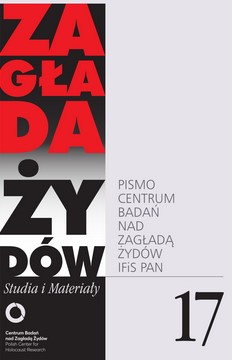Gdy Fajga porzuciła Tadeusza. Wojenne związki ocalałych po Zagładzie
When Fajga abandoned Tadeusz. War ties of the Holocaust survivors
Author(s): Natalia AleksiunSubject(s): WW II and following years (1940 - 1949), History of the Holocaust, History of Antisemitism, Ethnic Minorities Studies
Published by: Stowarzyszenie Centrum Badań nad Zagładą Żydów & IFiS PAN
Keywords: Aryan papers; sexual barter; gender; rational relationships; Righteous among the Nations;
Summary/Abstract: This article examines the post-war correspondence between Fajga Ginsburg, a Polish Jewish woman who survived the Holocaust in Lwów (today Lviv in Ukraine), and Tadeusz Kobyłko – a Pole who hid her and her niece. Their letters offer a window into intimate dilemmas in the aftermath of the war. Their relationship exemplifies decisions made by survivors with regard to their identity. Fajga’s letters express the emotional trauma of Jews who survived the Holocaust and show the lasting effects of post-war choices made by the survivors. Her letters also reveal how differently Faiga and Tadeusz understood their relationship and subsequent separation, in part due to their addressing different audiences whilst writing. While Fajga wrote personal letters to her husband, Tadeusz’s letters were sent to various Jewish and Polish institutions and were more official in nature. His letters clearly echoed his anger at the “Jews” whom he blamed for the breakdown of his family, but they are also permeated by a sense of threat of post-war antisemitism in Poland, as he himself experienced it after Fajga’s departure. Although the exchange of letters between Fajga and Tadeusz is full of understatements, it refutes the stereotypes of a “nationalist Pole” and a “self-conscious Jew”. Indeed, both categories turn out to be an oversimplification that does not reflect the complexity of the relationship, especially the one initiated under the duress of the Holocaust.
Journal: Zagłada Żydów. Studia i Materiały
- Issue Year: 2021
- Issue No: 17
- Page Range: 229-260
- Page Count: 32
- Language: Polish

